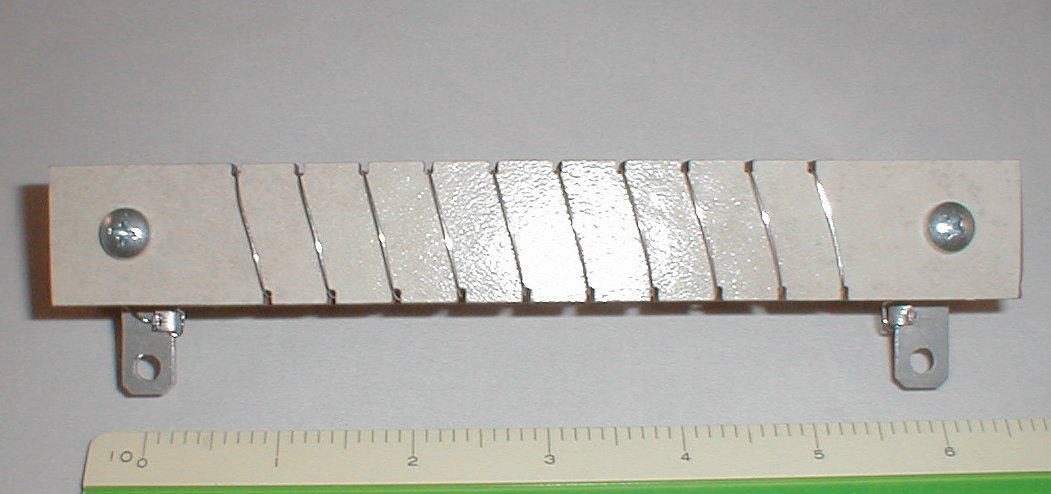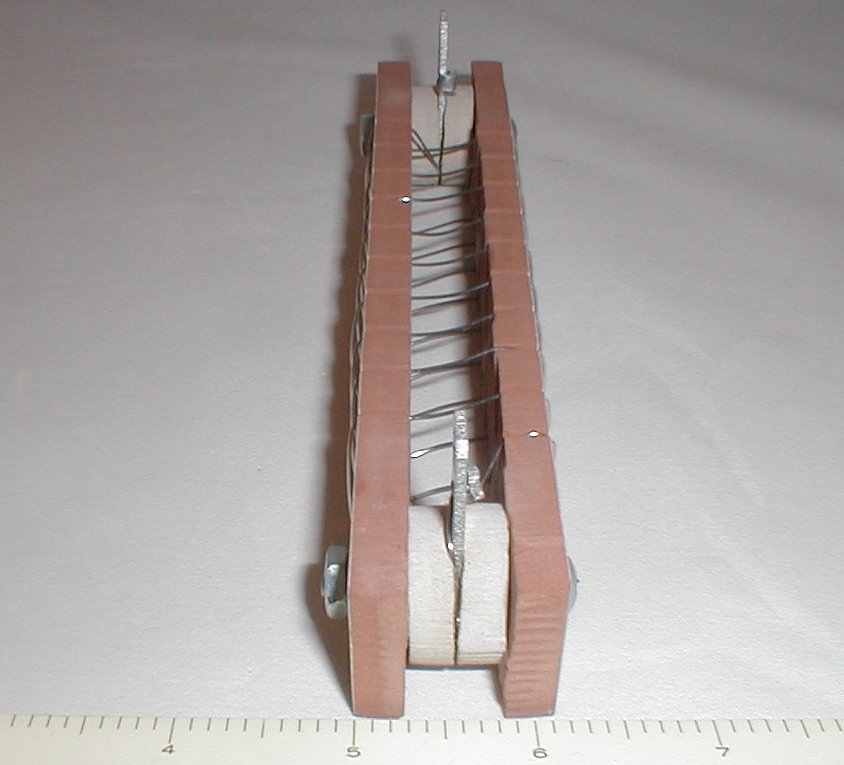Description
4.25 OHM – 500 WATT (total capacity) power resistor designed for 12, 24 or 48 volt systems.
- 53 watts at 15 volts — see chart below.
- 212 watts at 30 volts — see chart below.
- 846 watts at 60 volts — see chart below.
These resistors (heating elements) have been custom made specifically to perform as diversion (dummy) loads in solar/wind/hydro alternate energy systems.
Place multiple elements in parallel to increase the total wattage. See chart below.
Unlike water heating elements, these resistors do not need to be submerged in water or oil, they will dissipate the incoming energy in free air.
Each of the resistors we sell have been selected based on its ability to dissipate a very specific amount of power (watts) with a very specific resistance value (ohms), at a very specific voltage. When used as recommended, they will not burn out, even under continuous use.
Please note. These resistors will become hot during normal use, please mount them away from heat sensitive objects and out of the reach of children.
These custom heating elements are made with Kanthal A1 wire, wrapped around a ceramic tile, precision cut by our waterjet cutter (here in Coleman, Texas) to yield 4.25 ohms.

Image above may reflect wiring winding of other resistance values. Physical sizes of the tiles are standard.
Dimensions: Resistor body 6.9″ long, approx. 1″ square diameter, 5.80″ terminals center to center, .19″ diam terminal hole size. Terminals are made of .063-5052 aluminum.
Watts per single element at recommended voltages.
| Ohms | Volts | Amps | Watts |
| 4.25 | 12.0 | 2.82 | 33 |
| 4.25 | 12.5 | 2.94 | 37 |
| 4.25 | 13.0 | 3.05 | 40 |
| 4.25 | 13.5 | 3.17 | 43 |
| 4.25 | 14.0 | 3.29 | 46 |
| 4.25 | 14.4 | 3.38 | 48 |
| 4.25 | 14.5 | 3.41 | 70 |
| 4.25 | 15.0 | 3.52 | 53 |
| Area in green is where most diversion controllers would be set to divert. |
This 4.25 ohm resistor will dissipate 3.5 amps at 15 volts. This is 53 watts. Since the resistor is rated at 250 watts in an enclosure, this is well within the safe operating range.

Image above may reflect wiring winding of other resistance values. Physical sizes of the tiles are standard.
We have tested these elements at 400% design wattage and the resistors do not show any fatigue. The industrial rated, Kanthal A1 wire is extremely hardy, lasting 3 to 4 times longer than conventional elements using Nichrome wire. There is very limited oxidation of the wire even at very high temps and less than optimum humidity levels. Kanthal A1 wire is rated to 1400 degrees centigrade, more than 2000 degrees Fahrenheit.
Note: We do not recommend using the elements above 30 volts unless you enclose the resistors in firebrick or similar material as they will get VERY VERY hot within a matter of seconds, especially if you use multiple resistors side by side.The aluminum terminals will melt if this resistor is enclosed in a very small area and used at temperatures above 1000 F
We have set the recommended wattage of this resistor to 250 watts in an enclosure or 500 watts free air.
You may use the resistor up to 1500 watts without damage to the resistor providing you properly protect people and the surrounding area from the intense heat that is generated by even a single resistor at higher voltages. Using the resistor above these values must be done with extreme caution, as we have not tested them beyond the values stated above. The resistor itself is probably capable of handing much higher wattage; however, extreme caution must be taken to ensure your mounting and containment solution is capable of the heat being dissipated. DO NOT attempt to use this resistor above 80 volts, it, and possibly the surrounding area MAY BE DESTROYED!
If you double the voltage the resistor is used at, you quadruple the wattage! P=I^2*R (watts = the square of the amperage times the resistance.)
For a 4.25 ohm resistor:
12 volts (2.8 amps) = 33 watts (2.8 x 2.8 x 4.25)
24 volts (5.64 amps) = 133 watts (5.64 x 5.64 x 4.25)
30 volts (7.05 amps) = 211 watts (7.05 x 7.05 x 4.25)
48 volts (16 amps) = 768 watts (16 x 16 x 3)
60 volts (14.11 amps) = 846 watts (14.11 x 14.11 x 4.25) – — — VERY HOT!
75 volts (17.64 amps) = 1322 watts (7.64 x 17.64 x 4.25) – — — VERY HOT!
120 volts (28.23 amps) = 3386 watts (28.23 x 28.23 x 4.25) – — Resistor will be destroyed — don’t try it!
DO NOT USE IN OR AROUND WATER, THE KANTHAL WIRE IS NOT INSULATED AND WILL RESULT IN THE FULL VOLTAGE BEING TRANSFERRED TO THE WATER WHICH COULD BE LETHAL!!
Example of putting resistors in parallel (the image below depicts a different model resistor, however the hookup is the same.)

Place multiple resistors in parallel to increase the wattage/amperage.
- 1 resistor at 15 volts = 53 watts.
- 2 resistors in parallel at 15 volts = 106 watts.
- 3 resistors in parallel at 15 volts = 159 watts.
- 4 resistors in parallel at 15 volts = 212 watts. — You get the picture.


Reviews
There are no reviews yet.